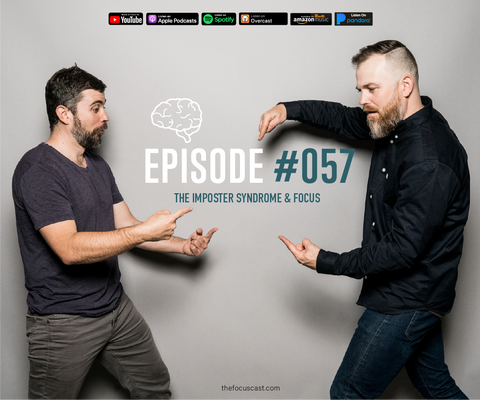
#57 Imposter Syndrome & Focus
Welcome to the FocusCast on this episode we’re discussing the imposter syndrome. Damn bro, that sounds pretty heavy. We’ll dive into the how’s and why’s and see if we can find a few solutions to help us overcome the imposter syndrome if it’s affecting our lives.
00:00 Intro to the imposter syndrome
00:25 Intro to the podcast
00:52 Why are we talking about the Imposter Syndrome
01:25 What is the Imposter Syndrome
15:30 Signs you struggle with Imposter Syndrome
20:50 Solutions to the Imposter Syndrome
WATCH
PROBLEM: We’re talking about the imposter syndrome. This was actually a request from one of our listeners right? First lets get a definition and nail down what exactly this is
- Definition:(Harvard Business Review) Imposter syndrome can be defined as a collection of feelings of inadequacy that persist despite evident success. ‘Imposters’ suffer from chronic self-doubt and a sense of intellectual fraudulence that override any feelings of success or external proof of their competence.
- (Psychology Today): Imposter syndrome was first documented in high-achieving women in the 1970s. While imposter syndrome is still more prevalent among women, and specifically women of color, men are also susceptible to developing this mindset.
- (WebMD): One study found that about 70% of all people have felt like an imposter at some point.
- (Psychology Today): Imposter syndrome can be closely related to perfectionism, in which people feel pressure to perform at their absolute best 100 percent of the time, and when they don’t, they feel incompetent and anxious
- (WebMD): Studies show that those who are different from most of their peers, such as women in high-tech careers or first-generation college students, are more likely to have imposter syndrome.
- Imposter syndrome is not an official psychiatric diagnosis in the DSM (The Diagnostic and Statistical Manual of Mental Disorders)
- What can Trigger The Imposter Syndrome
- (Psychology Today): Calling attention to one’s success, ironically, can unleash feelings of imposter syndrome. This could occur when receiving an award, passing an exam, or being promoted. Failure after a string of successes can also cause someone to critique and question their overall aptitude.
- Signs of Imposter Syndrome (WebMD): Credit your successes to luck, charm, networking, others' misjudgment, or other things besides your abilities
- Potential Causes (WebMD): Many people who have imposter syndrome grew up in families that stressed achievement and success. If your parents went back and forth between overpraise and criticism, you may be more likely to have feelings of being a fraud later in life.
SOLUTION
- Understand the syndrome. Keep in mind that actual frauds don’t have imposter syndrome. The very fact that you have imposter syndrome shows that you’re not an imposter.Recognise imposter feelings when they emerge. Awareness is the first step to change, so ensure you track these thoughts
- Rewrite your mental programmes. Instead of telling yourself they are going to find you out or that you don’t deserve success, remind yourself that it’s normal not to know everything and that you will find out more as you progress.
- Reframe failure as a learning opportunity. Find out the lessons and use them constructively in future. This is a critical lesson for everyone.
- Quit the comparisons. Don’t measure yourself by other people’s achievements. For example, on social media you only see a highlight reel of someone’s life. This isn’t a good comparison to your own reality. Instead, focus on being a better version of yourself each day.
FIND US ON
https://thefocuscast.com
https://www.instagram.com/thefocuscast
https://www.tiktok.com/@thefocuscast
#focus #dream #ImposterSyndrome

Comments (0)
There are no comments for this article. Be the first one to leave a message!